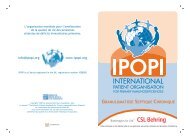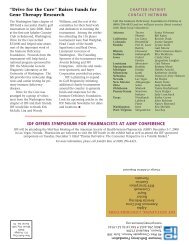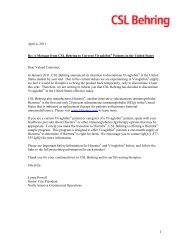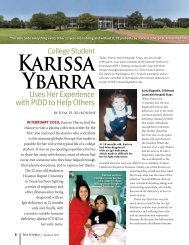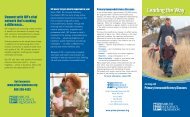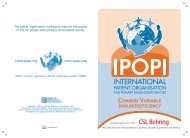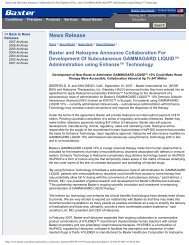IDF Patient & Family Handbook for Primary Immunodeficiency ... - IDFA
IDF Patient & Family Handbook for Primary Immunodeficiency ... - IDFA
IDF Patient & Family Handbook for Primary Immunodeficiency ... - IDFA
Create successful ePaper yourself
Turn your PDF publications into a flip-book with our unique Google optimized e-Paper software.
Adolescents with <strong>Primary</strong> <strong>Immunodeficiency</strong> Diseases 115<br />
Your Adolescent continued<br />
I hate being treated differently! Why can’t I be<br />
just like everybody else?<br />
Adolescents will vary in how much they wish<br />
to express their uniqueness or blend in with<br />
the crowd. Helping your adolescent find their<br />
own unique qualities and talents will help build<br />
confidence and reduce the likelihood that they see<br />
their uniqueness mainly as being the person in<br />
their group that has an uncommon disease.<br />
What do I tell my friends about primary<br />
immunodeficiency disease?<br />
This may be related to the question about<br />
being treated differently. It also involves learning<br />
relationship skills of trust building and sharing.<br />
Your adolescent can benefit from a trusted peer<br />
who can understand and offer personal support<br />
when a primary immunodeficiency can disrupt<br />
a regular routine. Your adolescent can also be<br />
hurt by less mature peers who use personal<br />
in<strong>for</strong>mation as a way to bully or tease. Help your<br />
adolescent make wise choices in their friendships<br />
and personal sharing.<br />
How do I handle this at school?<br />
When your adolescent asks this, it might be<br />
more about the friendship aspect of school. Your<br />
adolescent may also be asking about how to<br />
deal with teachers, coaches, assignments, and<br />
team requirements. While a long-term goal is<br />
self-responsibility, some school issues may require<br />
parents to be more active in helping establish<br />
positive relationships with school personnel and<br />
in establishing realistic expectations <strong>for</strong> balancing<br />
health and school per<strong>for</strong>mance.<br />
Why do I have to go see my physician/take<br />
my medications/continue my treatments?<br />
As adolescents learn new levels of responsibility,<br />
there will be times that they will want to do things<br />
differently. Begin by hearing out the adolescent’s<br />
concerns and responding with the details of<br />
treatment decisions previously made, realizing that<br />
some of these decisions and routines may have<br />
been originally made when the adolescent was<br />
much younger and not involved in the in<strong>for</strong>mation<br />
gathering or decision making process. Some of<br />
the questions about care may relate to a healthy<br />
need to have a greater sense of control over<br />
their life. This may be a good time to review the<br />
adolescent’s current responsibilities throughout<br />
their life, not only with their healthcare, but also<br />
with their home responsibilities, schoolwork, and<br />
leisure activities. Having a greater sense of control<br />
in other areas often helps balance the sense of<br />
lacking control that can come with some of the<br />
symptoms of a primary immunodeficiency disease.<br />
Am I going to be dealing with this<br />
disease <strong>for</strong>ever?<br />
Younger adolescents may ask this when they<br />
realize that their primary immunodeficiency will<br />
not be like other health problems they may have<br />
experienced, like a sprained ankle or broken bone,<br />
which has healed and is now <strong>for</strong>gotten. This may<br />
be about that balance of addressing the illness<br />
and health aspects of their disease, and realizing<br />
how health and wellness habits will help them.<br />
Older adolescents may ask this when they are<br />
thinking about their future—career plans, college<br />
plans, or developing relationships. Discuss how<br />
they can apply their earlier learning experience<br />
to these new challenges of young adulthood,<br />
and suggest talking with their physician or other<br />
healthcare professionals.<br />
Why do I have to have this disease? It’s not fair!<br />
This is a very tough question. It is one often asked<br />
by parents as well as their adolescents. This may<br />
be a question about their particular disease and<br />
how the immune system works. Often, though,<br />
this question is looking beyond scientific answers<br />
and looking more toward personal beliefs and<br />
values about life. Families need to reach out to<br />
the people and resources they have <strong>for</strong> finding<br />
meaning in life.








